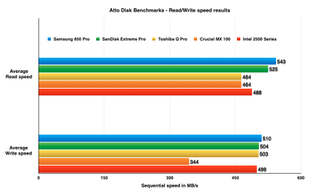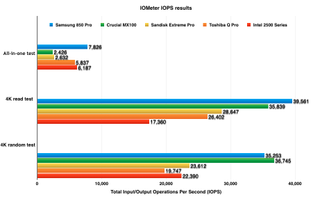SSD Grouptest: Crucial, Intel, Toshiba, Samsung and SanDisk
Super-charge your office life with an SSD. We test five of the best
Atto Disk Benchmark
This in-depth tool tested read and write performance with a wide variety of file sizes. Our tests use files in sizes from 8KB to 8MB, providing an indication of all-round speed.
The Samsung SSD led the way in six of the seven read tests, and its top read speed of 596MB/s in the 8MB test pushed the SATA connection's bandwidth to its limits. It only faltered in the 8KB test, where its 438MB/s pace fell behind the SanDisk's 462MB/s score. SanDisk's drive, meanwhile, impressed in the first tests, but slipped to mid-table when working with larger files.

Crucial's drive didn't get off to a great start in Atto's small file read tests, where it propped up our results table but it improved and took second place in several of the larger file read benchmarks. Intel's drive traded blows with the Crucial and SanDisk drives when reading files, but the Toshiba's middling small file read performance declined to this group's worst figures in larger file tests.
The situation at the top of the table wasn't as clear-cut in Atto's file writing benchmarks. The Samsung and SanDisk both performed well in small file tests, but both slipped in larger file benchmarks surprisingly, the Toshiba was the fastest SSD in the four tests in the 256KB to 8MB range. The Intel SSD was mid-table, and the Crucial was bottom of the heap in every Atto write test.
IOMeter
We used IOMeter to test intensive drive performance over longer stretches important if you're planning on using the devices for high-end workloads. Our benchmarks were run over a period of thirty minutes, which is ample for gauging long-term performance.
Get the ITPro. daily newsletter
Receive our latest news, industry updates, featured resources and more. Sign up today to receive our FREE report on AI cyber crime & security - newly updated for 2024.
Our first test, the all-in-one benchmark, is a good indicator of all-round performance. The Samsung drive topped the table with a superb result of 7,826 IOPS, with the Intel drive's 6,187 IOPS result taking a surprising second place. Third went to the Toshiba(5,837 IOPS) still in touching distance of the two leaders. Crucial and SanDisk's drives couldn't keep up, posting sub-3,000 IOPS scores.

The Samsung's all-in-one speed of 300MB/s was dominant the next-best drive, Intel's 2500 Series, could only hit 237MB/s. And, in the all-in-one test's average and maximum response times, the 850 Pro continued to lead.
The story was the same in the 4K read benchmark. The 850 Pro took the lead in three of the four tests, with the Crucial comfortably in second place only these two drives returned scores beyond 30,000 IOPS. There was little to choose between the third-place SanDisk and fourth-placed Toshiba drive, and the Intel drive came last, with less than half the pace of the Samsung in the IOPS and speed tests.
Our 4K random file benchmark was unpredictable, and here Samsung came in second behind the budget Crucial MX100 drive: the 850 Pro topped out at 35,253 IOPS and 144MB/s, while the Crucial delivered 36,745 IOPS and 151MB/s. Both drives had good average response times, but the MX100's top response time of 49.1s was the worst on test.
The Toshiba drive faltered to last place in the 4K random file tests, with the SanDisk in third and the Intel in fourth but all three of these drives were a long way behind the Crucial and Samsung SSDs.
Mike Jennings has worked as a technology journalist for more than a decade and has been fascinated by computers since childhood, when he spent far too long building terrible websites. He loves desktop PCs, components, laptops and anything to do with the latest hardware.
Mike worked as a staff writer at PC Pro magazine in London for seven years, and during that time wrote for a variety of other tech titles, including Custom PC, Micro Mart and Computer Shopper. Since 2013, he’s been a freelance tech writer, and writes regularly for titles like Wired, TechRadar, Stuff, TechSpot, IT Pro, TrustedReviews and TechAdvisor. He still loves tech and covers everything from the latest business hardware and software to high-end gaming gear, and you’ll find him on plenty of sites writing reviews, features and guides on a vast range of topics.
You can email Mike at mike@mike-jennings.net, or find him on Twitter at @mikejjennings





